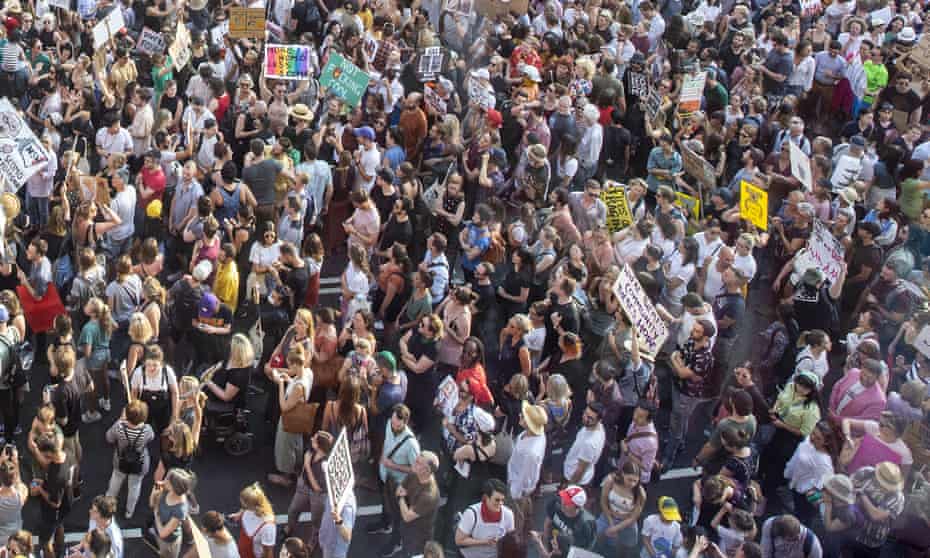Extract from The Guardian
Australia needs a mass citizens’ movement, bringing together friend and foe, farmer and city dweller, across generations

Now there are climate hawks and climate doves. Hawks see a global emergency and the need to mobilise as if human civilisation is at stake. Doves – the moderates in the business community and governments who serve their interests – see a serious environmental problem that we should address, but slowly and without too much disruption, especially to them.
While we welcome the “all aboard the climate train” phenomena, we view the rhetoric and support for action over time, and as late as 2050, as disingenuous at best and fatal at worst.

That’s because action is needed right now. There is no choice because the world is burning, flooding and melting now. Now is when people’s lives are being lost, and homes destroyed. Now is when billions of dollars of value are being destroyed, with disruptive economic change imminent.
Everything happening around the world is exactly as forecast, though earlier than expected. James Hansen, one of the world’s leading climate scientists, addressed the US Congress more than 30 years ago, warning: “If we burn all the fossil fuels, we will destroy the world.”
Three decades on every reputable climate scientist agrees with this stark assessment. But now it’s not a forecast, it’s the primary fact against which all actions must be judged.
Who can forget the massive wall of fire and smoke that advanced across eastern Australia two summers ago, with scarcely believable scenes of evacuations by warship from beaches where people had fled, and millions of hectares of decimated landscapes and a billion native creatures burnt to death.
That same intensity was replicated this year with wildfires in northern Europe and North America, while devastating floods destroyed whole towns in Germany. Then came a rainfall event in China where a years’ rain fell in one day.
The political response in Australia? Plans for ramped-up coal and gas exploitation around the nation, including the massive Galilee field in Queensland and Beetaloo basin in the Northern Territory, endorsed by the federal and state governments of both hues. The prime minister is pushing ahead with a “gas-led recovery”, where the super warming gas methane will be pumped into the atmosphere in great volume, accelerating our descent into the fires of a global warming hell.
There are few examples in history, short of war, where transformational change occurred without mass civil uprising
Australia’s polity is sleepwalking towards the apocalypse, to a state of disequilibrium so wild the Covid pandemic will seem millpond calm by comparison. Our repeated low ranking as a nation taking serious climate measures is hardly surprising, such is the toxic combination of compliant politicians and the greedy cabal of fossil fuel and energy companies intent on prolonging their planet-harming business model.
The next phase of the struggle between the climate hawks, now including some big money players, and the climate doves, is under way. The doves still believe you can negotiate with mother nature, that she will slow down physics and chemistry – and climate impacts – while we gently guide our economy to catch up, and that there are windfall profits to be made from the chaos that ensues.
At this critical juncture does the climate movement drown, washed away by a rising tide of greenwash and rhetoric, akin to the former prime minister John Howard’s line that “We’re all environmentalists now”. Or is there a surer path that can be taken, leading to genuine security and survival? And what would it take to go down that path?
For a start Australia must wake up that the world, and the global economy our prosperity depends upon, is changing around us. Our political leaders’ debates about which industry they do or don’t support are absurd, as if their views impact how the market responds. Despite price gyrations to come, the fossil fuel industry is now in a global death spiral and a new green industry is racing to replace it.
We also need a broad citizens’ movement to emerge, with good old-fashioned political organising bringing together friend and foe, farmer and city dweller, across generations, to chart a new and equitable clean energy course.
We need to remember that there are few examples in history, short of war, where transformational social change occurred without mass civil uprising.
This
means sharper-focused civil disobedience, in the Ghandian tradition, on a
large scale. We saw this emerge pre-Covid with groups including
Extinction Rebellion and the youth climate strikes showing the
mainstream environmental movement that taking to the streets is as
important, in some cases more important, than clicking our screens or
writing reports. To be successful acts of protest must be totally
non-violent and genuinely peaceful, or public support will drop.
The
other element to this approach, personified by Greta Thunberg and the
school strikes movement, provide an important lesson to climate
emergency advocates. They do not engage in detailed debates about policy
and economics. That is the task of experts, not protesters.
They
simply said listen and then act on the science. Do what the experts say
we should do. Don’t look to us for the answer. Don’t let us give you
hope. Just do your job as leaders. Act.
It will be crucial for the mainstream legal and business worlds to fall in behind this movement. Like the class action launched by eight young people to prevent the approval of a coalmine expansion by environment minister Sussan Ley. Like investors voting down the board of Exxon and demanding the company change.
Finally, if we want to achieve the necessary dramatic emissions reductions in the next 10 years they must be delivered by our current political and economic system.
This requires every member of parliament to feel the anger, fear and determination of the Australian people, through all available options including meetings, phone calls, occupation of offices and countless community-focused actions. It’s old school, it can’t always be done virtually, and it can work.
The threat here is not to life on Earth. The threat is to humanity and the ecosystems that support us. As the world’s climate scientists note in the latest IPCC report: “Life on Earth can recover from a drastic climate shift by evolving into new species and creating new ecosystems … Humans cannot.”
Peter Garrett is a musician, activist and former federal environment minister. Paul Gilding is a fellow at the Cambridge University Institute of Sustainability and a former executive director of Greenpeace International
No comments:
Post a Comment